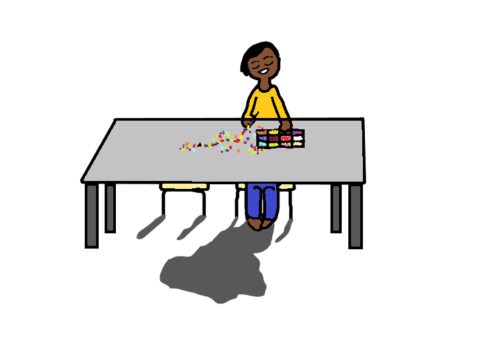How do your children get ready for school in the morning? Can they put their clothes on and button or zip themselves? Do they put their pencils and crayons in their pencil box and shut the lid tight? How about their shoelaces—can they tie them? These activities involve the use of smaller muscles of the hands. When children draw a flower, color within the lines, and cut it out to make a greeting card for you, they use their fine motor skills.
Children with well-developed fine motor skills can do these activities quickly and accurately. As a result, they are more independent and confident. In the parent awareness meetings I’ve been to, many share that they string beads or play with chapatthi dough. These are great but keep in mind that children need to develop a range of motor skills that include crossing the midline, bilateral coordination, eye-hand coordination, visual-perceptual, and visual-motor skills.
You can check out OT blogs such as https://www.ot-mom-learning-activities.com/ for detailed explanations of how and why these skills are vital for handwriting development.
When should you be concerned about your child’s handwriting?
That depends on your child’s age. Our schools require children to learn to write at a very young age. If we expect four-year-old children to write their letters perfectly, a few children will do so. But most others will not. So use your judgment to determine if the difficulty is because of unrealistic expectations or is it because of the following concerns:
- You are unable to understand and read your child’s writing because of poor letter formation, missing letters,
- The writing is messy with letters of different sizes, multiple strokes to form the letters, sentences not on the line, too much or too little space between the letters or words,
- Writing is either too dark or too faint, showing too much or too little pressure on the pencil to paper
- The child is unable to sit for long periods, not able to attend to tasks
- The child is unable to organize thoughts to write them down.
Many aspects of fine motor development can affect how children write. If you suspect that your child has poor fine motor skills, seek an evaluation from a pediatric occupational therapist. There are many ideas on the internet on how to work on your child’s fine motor skills, but you don’t know if those activities will develop the specific skills your child needs.
A child who shows delays in fine motor skills will struggle to bridge the gap. Our schools require children to learn to write at a very young age, and as children grow older, the amount of writing increases. That is why timely evaluation and intervention are essential. There have been instances when I’ve advised parents to seek an assessment from an occupational therapist for their child. The same parents came back the following year with the same concerns about their child’s performance in class. Only now, the child was a year older, and the demands to sit, attend, and complete tasks had increased!
If your child’s teacher suggests that you get professional help for your child’s handwriting, please do so. That doesn’t mean you send your child to a handwriting class straight away. You should first get an evaluation from a developmental or pediatric occupational therapist and rule out any needs in postural control, muscle tone or fine motor skills, or visual tracking.
There are specific considerations when it comes to hiring the services of an occupational therapist. Do make sure that you are working with a licensed professional. Unfortunately, there have been cases where parents who have sought help for their child open centers which offer the same activities and exercises to all their ‘clients.’
Well-trained therapists must explain what skills they are working on in their sessions and how they benefit your child. They must also give ‘homework,’ that is, activities where you can reinforce the same skills. Children spend most of their time with their parents or with their teachers. A thirty or forty-five minute session a week is not enough to meet their therapy goals. Therefore, don’t leave the therapy center without suggestions for you to practice with your child. And do share these goals and activities with your child’s teachers.
My last point, parents, is about your expectation. Sometimes we get sucked into all the things our children can’t do that we overlook the evidence of progress. I suggest that you collect your child’s writing every month and make a portfolio. Review the work every three months to see how much your child has progressed. That will help ease some of the pressure you and your child feel.





